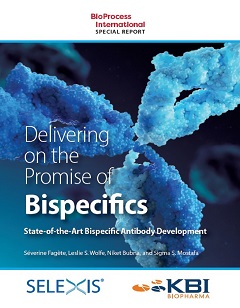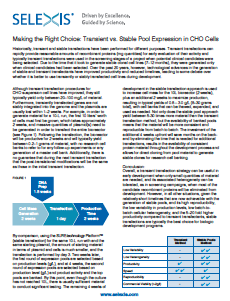An off-the-shelf therapy that can be used immediately, rather than one that must be manufactured individually for each patient (such as chimeric antigen receptor T-cell therapies, or CAR-Ts), can be a life-saving treatment for patients who encounter difficult-to-treat or rapidly progressing diseases, including many cancers. The promise of bispecific antibodies (bsAbs) stems from their off-the-shelf nature and ability to bind to two or more different targets or epitopes, thereby performing multiple functions.

1 min read
BioProcess International Special Report: Delivering on the Promise of Bispecifics
Keywords: clonal cell lines chinese hamster ovary cells transient transfection expression pools SUREtechnology Platform CHO cells

1 min read
Making the Right Choice: Transient vs. Stable Pool Expression in CHO Cells
Historically, transient and stable transfections have been performed for different purposes. Transient transfections can rapidly provide reasonable amounts of recombinant proteins (mg quantities) for early evaluation of their activity and typically transient transfections were used in the screening stages of a project when potential clinical candidates were being selected. Due to the time that it took to generate stable clonal cell lines (7–12 months), they were generated only when clinical candidates had been selected. Over the past 20 years, however, technological advances in the generation of stable and transient transfectants have improved productivity and reduced timelines, leading to some debate over whether it is better to use transiently or stably transfected cell lines during development.

